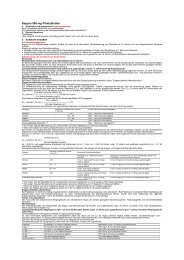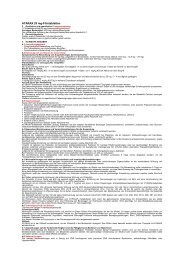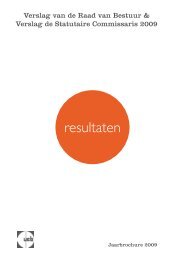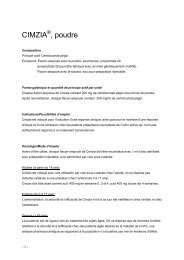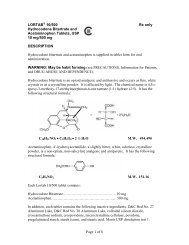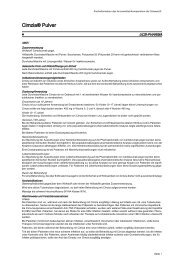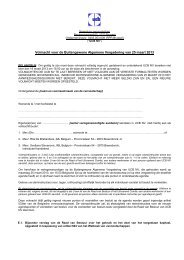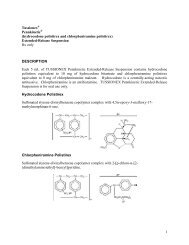KEPPRA (levetiracetam) Rx only 250 mg, 500 mg, 750 mg ... - UCB
KEPPRA (levetiracetam) Rx only 250 mg, 500 mg, 750 mg ... - UCB
KEPPRA (levetiracetam) Rx only 250 mg, 500 mg, 750 mg ... - UCB
You also want an ePaper? Increase the reach of your titles
YUMPU automatically turns print PDFs into web optimized ePapers that Google loves.
A total of 13.3% of <strong>KEPPRA</strong> patients experienced other behavioral symptoms (reported as<br />
aggression, agitation, anger, anxiety, apathy, depersonalization, depression, emotional<br />
lability, hostility, irritability, etc.) compared to 6.2% of placebo patients. Approximately half<br />
of these patients reported these events within the first 4 weeks. A total of 1.7% of treated<br />
patients discontinued treatment due to these events, compared to 0.2% of placebo patients.<br />
The treatment dose was reduced in 0.8% of treated patients and in 0.5% of placebo patients.<br />
A total of 0.8% of treated patients had a serious behavioral event (compared to 0.2% of<br />
placebo patients) and were hospitalized.<br />
In addition, 4 (0.5%) of treated patients attempted suicide compared to 0% of placebo<br />
patients. One of these patients completed suicide. In the other 3 patients, the events did not<br />
lead to discontinuation or dose reduction. The events occurred after patients had been treated<br />
for between 4 weeks and 6 months (see PRECAUTIONS, Information For Patients).<br />
Pediatric Patients<br />
In pediatric patients experiencing partial onset seizures, <strong>KEPPRA</strong> is associated with<br />
somnolence, fatigue, and behavioral abnormalities.<br />
In the double-blind, controlled trial in children with epilepsy experiencing partial onset<br />
seizures, 22.8% of <strong>KEPPRA</strong>-treated patients experienced somnolence, compared to 11.3% of<br />
placebo patients. The design of the study prevented accurately assessing dose-response<br />
effects. No patient discontinued treatment for somnolence. In about 3.0% of <strong>KEPPRA</strong>treated<br />
patients and in 3.1% of placebo patients the dose was reduced as a result of<br />
somnolence.<br />
Asthenia was reported in 8.9% of <strong>KEPPRA</strong>-treated patients, compared to 3.1% of placebo<br />
patients. No patient discontinued treatment for asthenia, but asthenia led to a dose reduction<br />
in 3.0% of <strong>KEPPRA</strong>-treated patients compared to 0% of placebo patients.<br />
A total of 37.6% of the <strong>KEPPRA</strong>-treated patients experienced behavioral symptoms (reported<br />
as agitation, anxiety, apathy, depersonalization, depression, emotional lability, hostility,<br />
hyperkinesia, nervousness, neurosis, and personality disorder), compared to 18.6% of placebo<br />
patients. Hostility was reported in 11.9% of <strong>KEPPRA</strong>-treated patients, compared to 6.2% of<br />
placebo patients. Nervousness was reported in 9.9% of <strong>KEPPRA</strong>-treated patients, compared<br />
to 2.1% of placebo patients. Depression was reported in 3.0% of <strong>KEPPRA</strong>-treated patients,<br />
compared to 1.0% of placebo patients.<br />
One <strong>KEPPRA</strong>-treated patient experienced suicidal ideation (see PRECAUTIONS,<br />
Information For Patients).<br />
A total of 3.0% of <strong>KEPPRA</strong>-treated patients discontinued treatment due to psychotic and<br />
nonpsychotic adverse events, compared to 4.1% of placebo patients. Overall, 10.9% of<br />
<strong>KEPPRA</strong>-treated patients experienced behavioral symptoms associated with discontinuation<br />
or dose reduction, compared to 6.2% of placebo patients.<br />
Page 14 of 36



